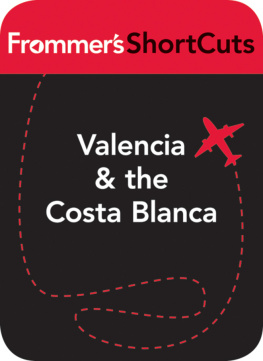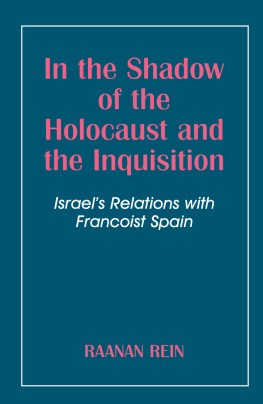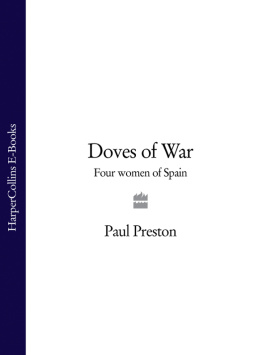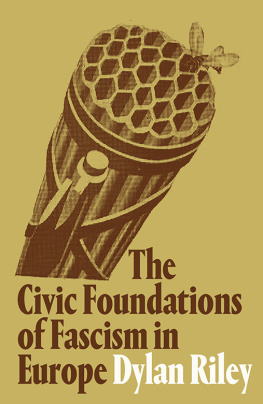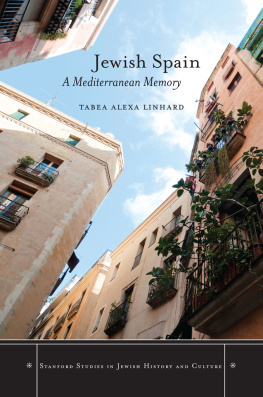Antiauthoritarian Youth Culture
in Francoist Spain
Also available from Bloomsbury
Consumption and Gender in Southern Europe since the Long 1960s, edited by Kostis Kornetis, Eirini Kotsovili and Nikolaos Papadogiannis
Fighting for Franco: International Volunteers in Nationalist Spain during the Spanish Civil War, Judith Keene
Global Punk: Resistance and Rebellion in Everyday Life, Kevin Dunn
The History of Modern Spain: Chronologies, Themes, Individuals, edited by Adrian Shubert and Jos Alvarez Junco
Interrogating Francoism: History and Dictatorship in Twentieth-Century Spain, edited by Helen Graham
Punk Style, Monica Sklar
Right-Wing Spain in the Civil War Era: Soldiers of God and Apostles of the Fatherland, 191445, edited by Alejandro Quiroga and Miguel ngel del Arco Blanco
Transnational Fascism in the: Twentieth Century Spain, Italy and the Global Neo-Fascist Network, edited by Matteo Albanese, Pablo del Hierro
A mi mam. Te debo todo. Sin tu apoyo y cario este trabajo no hubiera sido posible.
Landing at Madrids Barajas International Airport in May of 2011, I arrived to what had become the largest youth movement in Spain since the death of the dictator Francisco Franco in 1975, who had ruled since the Spanish Civil War (19361939). When I booked my ticket from New York City to Madrid, I had expected a quiet summer researching Spanish youth culture and dissent of the 1960s and 1970s, digging through boxes of forgotten paper in the Archivo General de la Administracin, attending a seminar or two and giving a talk at the Association of Spanish and Portuguese Historical Studies Annual Conference to be held that year in Lisbon. Climbing into the taxi, I was confronted with the energized sounds of young people singing songs of dissent on the radio; tens of thousands of people were marching through Madrids city centre, la Puerta del Sol, calling themselves Indignados, or the indignant ones. The taxi driver, a man in his late 30s, commented to me, Man, its about time someone did something about the state of things in this country. In fact, the protests would reach every major city in the country within a week.
After years of recession, Western democracies started showing symptoms of an oncoming crisis the likes of which had not been experienced since before the Second World War. Across Europe, young people felt corporate interests were placed above those of the people. Economic stagnation tarnished the dream of a prosperous Europe promised at the turn of the millennium, when Europeans adopted a common currency. Already in 2010, in Hungary, Viktor Orbns far-right nationalist party, Fidesz, had gained control of the country. Putins Russia had become a de facto oligarchy. Poland, Greece, Austria and even France were flirting with far-right authoritarianism and nationalism, once again.
At the heart of this recession and economic crisis was the simple fact that the European Union (EU) was formed primarily for purposes of economic integration as the European Economic Community; an assumption was made that cultural integration would follow economic integration. To some extent, cultural integration had begun, but as the economic crisis worsened, nations, ethnic groups and social classes began to turn on each other. The EU had failed its primary promise of economic stability, causing nationalist self-interests to swell. In a twist of fate, echoing the interwar years, xenophobia arose anew. Across Europe, immigrants and minority groups received the brunt of the backlash the scapegoating. However, some countries handled this crisis not with a fascistic backlash, but, instead, imagined new possibilities. Simultaneous to the coming upsurge in new nationalism and far-right fascistic behaviour, an anarchist-inspired youth movement emerged in Madrid, utilizing decentred power structures that relied on flat, non-hierarchical organizing inspired by an Arab Spring of 2011, located most fervently in Tunisia, Libya, Egypt, Yemen, Syria and Bahrain.
With 21 per cent of all Spaniards unemployed, and an astounding 43.5 per cent of people under the age of 30 in that precarious situation, the highest youth unemployment rate in the EU at that time, The nascent movement asked for the unemployed, poorly paid, the subcontractors, those in precarious positions, and young people to take the streets on 15 May. Some 500 organizations pledged support of the action. This action resulted in an encampment of the heart of Madrid that came to interrupt the commercial capital of Spain. Not only was Real Democracy Now a condemnation of the type of democracy that arose out of the Spanish transition, one that turned its back on the socialism of Madrids mayor, Enrique Tierno Galvn, giving way instead to a neoliberal capitalism, it marked a wave of discontent that crossed the Mediterranean during the Arab Spring, and threatened to spread throughout the continent even crossing the Atlantic to become Occupy Wall Street.
During the months leading up to the Spanish Revolution of 2011, anarcho-syndicalist groups came to clashes in Catalunya, Basque Country and Galicia; retirement age was moved from 65 to 67 and new threats of governmental austerity loomed. Adding to the discontent, in February, the Spanish government passed the Sinde law, an anti-internet download law similar to the failed American SOPA law, which allows for a judicial order to close down any web page that links to illegal downloads of copyrighted content. Moreover, since at least 2001, Spaniards had spoken of mileuristas (or college-educated young people that were making only 1,000 euros per month); already, in 2006, talk of quinientos euristas, or those topping off at 500 euros per month, started to appear. By 2011, it was not uncommon to hear of 300-euristas who worked multiple part-time jobs. It would be this vast unemployment rate that would be both the impetus for young people to act and what allowed them to dedicate so much of their time to the movement. With unemployment so high, camping in a plaza seemed to be as good of a job as any.
Two days before the 15th of May, the conservative-leaning Spanish newspaper A.B.C. suggested this was the start of another May revolution, evoking comparison to the protests in France and Germany during the May of 1968. Indeed, that 15th of May dispelled the popular belief that young Spaniards were pasotas, or young people that pass on their responsibilities family, school, activism, work, political discourse everything. However, high unemployment, low pay for those who could find jobs, a sense that owning a home was out of reach and a general disenchantment with the capitalist system pushed young apolitical Spaniards into action. The motto taken for the 15th of May protest was we are not goods in the hands of politicians and bankers pointing directly to what the participants saw as the problem they were facing. Indeed, it would be this same rhetoric that the American Occupy Wall Street protests would draw from in the autumn of that year.
What started off as a large organized march, following a sort of structured and orthodox form of dissent, transformed into a performance of everyday dissent. Young protestors simply set up a camp in the heart of Madrid and lived their lives in the public space. Rejecting the system, they sought to create a space that reflected the type of world they wanted to imagine for themselves. They created libraries, large kitchens, information centres, meditation tents, community work projects and publicly performed new models of democracy and society a precursor to Occupy Wall Street. For many young Spaniards across Spain the summer of 2011 embodied a performative shift in




